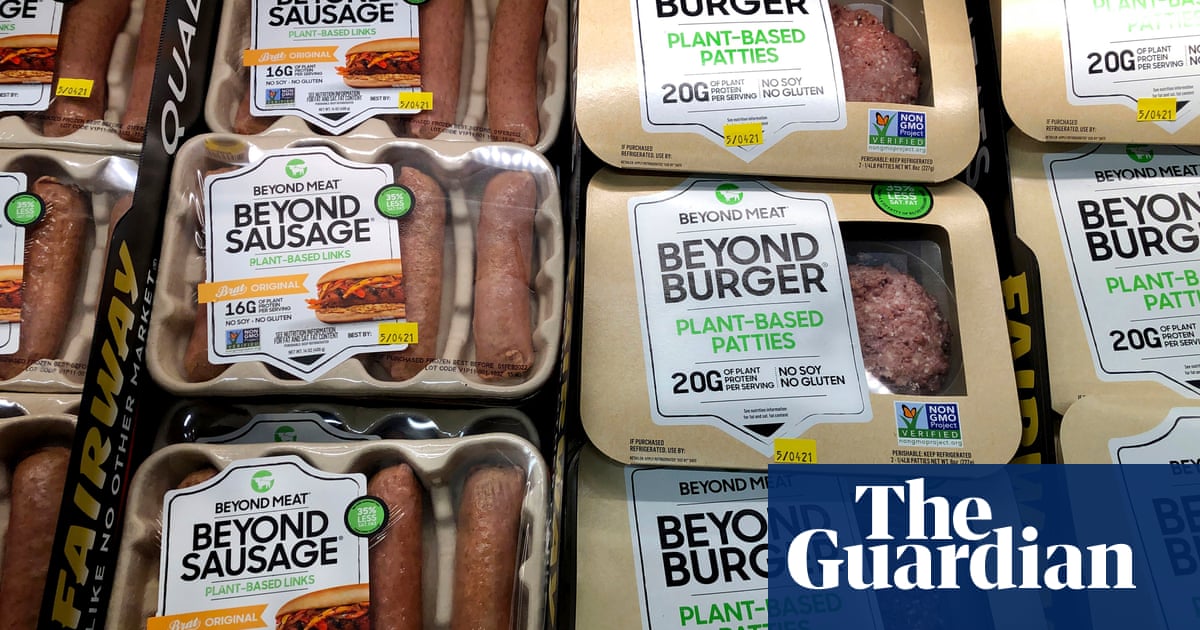
It launched with the promise to “eat what you love”, but consumers’ love affair with Beyond Meat’s pricey meat substitutes is waning.
Quarterly sales at the vegan burger maker have slumped by almost a third as shoppers shift away from expensive meat substitutes amid the cost of living crisis.
The US company, whose plant-based products include burgers that appear to bleed and imitations of sausages and meatballs, has cut its annual revenue forecast in the latest sign that the fake meat food bubble is bursting.
After several years of rapid expansion fuelled by a splurge of private equity investment, meat substitutes have dropped off many menus. Sales unexpectedly slid 6% in the UK last year.
Vegan specialists including Meatless Farm of Leeds and Lincolnshire-based Plant & Bean, which supplied companies including Quorn and Tesco’s Wicked Kitchen, called in administrators earlier this year as they battled lacklustre sales and hefty cost increases.
Meanwhile, Sweden’s Oatly, the Swiss food company Nestlé and the London-based Innocent Drinks, which is owned by Coca-Cola, are among those that have pulled vegan products from sale in the UK this year.
As the UK experience is echoed in the US and elsewhere, Beyond Meat, founded in 2009, has seen its market value plummet to $981m (£770m) from more than $10bn at its height in 2019 when it was worth more than US department store Macy’s or technology group Xerox.
Sales of fake meats in the UK are expected to fall or flatline again this year, according to market research firm Mintel.
As the cost of living crisis has put pressure on household budgets, shoppers have turned to cheaper proteins including processed meat and traditional vegan or vegetarian options such as chickpeas, lentils and beans.
Alice Pilkington, a food analyst at Mintel, said people expected that cutting down on meat would save them money but the price of fake meat products was becoming “increasingly a barrier as they were on a par or more expensive than meat or more traditional alternatives”.
A pack of two 113g Beyond Burger plant-based patties costs £4.30, or £19.03 per kg, at Tesco, while a pack of four 113.5g Finest beef steak burgers is priced at £4, or £8.81 per kg, at the retailer.
Enthusiasm has also been dampened by concerns about the highly processed nature of some fake meats, highlighted by recent investigations into the health impacts of ultra-processed foods, as well as a shift towards cooking from scratch using basic ingredients during the Covid pandemic lockdowns.
“A little bit of kitchen confidence has added to the switch,” Pilkington said.
Beyond Meat, which has co-developed McDonald’s McPlant vegan burger, said sales fell 30.5% to $102.1m in the quarter to 1 July, missing analysts’ expectations. Its net loss shrank to $53.5m from $97.1m a year earlier.
The company said it had been hit by “softer demand in the plant-based meat category, high inflation, rising interest rates and ongoing concerns about the likelihood of a recession”. The US trial run of the McPlant burger was cancelled last August but it is still on sale in the UK and Ireland.
Ethan Brown, the chief executive of Beyond Meat, said the ambiguity around the health benefits of eating plant-based meat had held back sales.
“This change in perception is not without encouragement from interest groups who have succeeded in seeding doubt and fear around the ingredients and process used to create our and other plant-based meats,” he said.
The company is now forecasting that sales will fall by at least 9% this year to no more than $380m, down from previous hopes of up to $415m.
As the market has shrunk, brands such as Beyond Meat and Meatless Farm have also suffered from rising competition from a plethora of brands with innovative ideas, some of which are flagging their use of simpler, more natural ingredients.
Paul Brown, the boss of British plant-based food brand BOL which does not use fake meat, said his group, which was founded in 2016, expected to increase sales by 50% this year.
He said BOL had deliberately chosen not to use fake meats: “I always thought there was going to be a bit of a backlash about the level of processing and artificial elements in some meat mimics.”
Pilkington said she was less optimistic now about the meat alternatives market than a year ago because of the squeeze on household finances but said growth would revive at some point.
Awareness of the impact of meat on climate change is expected to underpin long-term demand, although Pilkington said products featuring more natural vegetable and vegetarian proteins, such as chickpeas and lentils, were likely to lead growth as consumers sought more transparency and reassurance about the origins of ingredients in vegan ready meals.
“Nearly half of adults have reduced the amount of meat they eat or have stopped eating it entirely and another 14% have yet to reduce the amount of meat but want to,” she said.
“The group of flexitarians is growing and that is the target market for these products.”
Beyond Meat has attempted to attract more customers by offering its core products at prices that are at or below their animal protein equivalent.
Ethan Brown said: “We remain steadfast in our belief that plant-based meat, and Beyond Meat specifically, will play an important part of the global response to a climate crisis that appears to be rapidly intensifying.”











